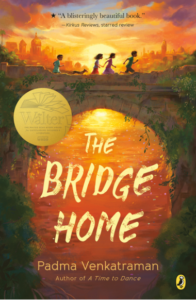Reviewed by Edi Campbell
Review Source: Cotton Quilts
Book Author: Padma Venkatraman
Padma Venkatraman has now published four books for young readers. She most often writes stories based in her Indian heritage and just as often reflects themes of social justice and activism. In The Bridge Home, her activism shifts in a more spiritual and inward direction.
The Bridge Home is an empowering story. Its literary techniques combine with well-crafted storytelling, allowing it to layer meaning and messages throughout. I realized this perspective after preparing a review for a journal. I think it’s a brilliant review (of course, I do!) so, I let it stand choosing to veer in a different direction here.
Some will view The Bridge Home as an intense book for young readers. The girls are physically abused (once) by their father, they run away from home becoming homeless and there is death. However, it’s important to note that Ms. Venkatraman is extremely sensitive to her readers. She foreshadows throughout the book and even goes so far as to deliver the essence of the story in the first chapter. Ms. Venkatraman is neither careless nor gratuitous in incorporating these traumas. Continue reading.

The Bridge Home by Padma Venkatraman
Published by Penguin on 2020
Genres: South Asian
Pages: 194
Reading Level: Grades 6-8
Review Source: Cotton Quilts
Also by this author: A Time to Dance
Publisher's Synopsis: "Readers will be captivated by this beautifully written novel about young people who must use their instincts and grit to survive. Padma infuses her story with hope and bravery that will inspire readers." - Aisha Saeed, author of the New York Times Bestseller Amal Unbound
Four determined homeless children make a life for themselves in Padma Venkatraman's stirring middle-grade debut. Life is harsh on the teeming streets of Chennai, India, so when runaway sisters Viji and Rukku arrive, their prospects look grim. Very quickly, eleven-year-old Viji discovers how vulnerable they are in this uncaring, dangerous world. Fortunately, the girls find shelter - and friendship - on an abandoned bridge that's also the hideout of Muthi and Arul, two homeless boys, and the four of them soon form a family of sorts. And while making their living scavenging the city's trash heaps is the pits, the kids find plenty to take pride in, too. After all, they are now the bosses of themselves and no longer dependent on untrustworthy adults. But when illness strikes, Viji must decide whether to risk seeking help from strangers or to keep holding on to their fragile, hard-fought freedom.

Leave a Reply